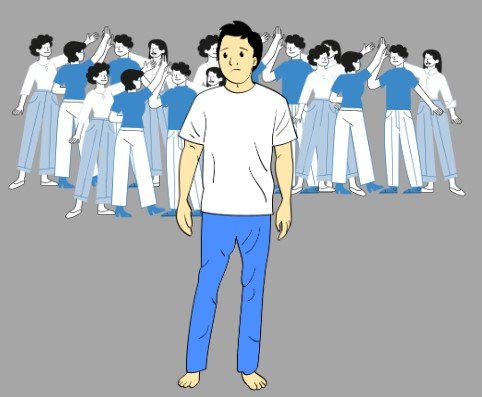The experience of isolation is becoming more common in a world that is becoming more complex and fragmented, despite the fact that humans are social creatures by nature, wired for connection and belonging. Isolation, whether physical or emotional, can have profound and far-reaching effects on an individual’s psychological well-being, affecting everything from mood and cognition to behavior and general health. This article explores isolation and mental health, examining its various forms, its psychological ramifications, and the ways in which people can manage and overcome this difficult experience.

Defining the Boundaries of Isolation
Isolation can manifest in various forms, each carrying its own unique set of challenges:
Social Isolation: This refers to a lack of social contact and engagement with others. It can be caused by factors such as living alone, geographical distance from family and friends, limited mobility, or social anxiety.
Emotional Isolation: This involves feeling separated from others on an emotional level, even when surrounded by people. It may be caused by a lack of intimacy and emotional support, feelings of being misunderstood or ignored, or trouble establishing close relationships.
Physical Isolation: This refers to being physically separated from other people, frequently as a result of circumstances like hospitalization, quarantine, or living in a remote location.
Perceived Isolation: This is the subjective feeling of being isolated, even if one has regular social contact. It can be influenced by individual perceptions, personality traits, and past
It’s critical to understand that isolation is defined by feelings of loneliness, alienation, and a lack of meaningful social engagement, even if solitude can also be a good and beneficial experience.
Isolation and mental Health : Psychological Fallout
The impact of isolation on an individual’s psychology can be significant and multifaceted:
Mood Disorders: One of the things that isolation does is to increase the chances of depression, anxiety, and other mood disorders. The absence of social support and connection can lead to feelings of sadness, hopelessness, and worthlessness.
Cognitive Decline: Research states the absence of the onlookers could worsen cognitive decline related to memory, attention, and executive functions. Reduced social interaction renders lesser cognitive stimulation, thereby leading to nivations in mental agility.
Increased Stress and Anxiety: Isolation can increase the stress levels and feelings of anxiety. Such an absence of social support can make it difficult to deal with challenges and stressors and increase vulnerability to anxiety and fear.
Behavioral Changes: Isolation can lead to withdrawal from social activities, increased irritability, and heightened difficulty regulating emotional states.
Self-Esteem Impact: The deficiency of social connection and validation can impact an individual’s self-esteem adversely, leading one into a sense of inadequacy, insecurity, and self-doubt.
The Neuroscience of Isolation
New research is beginning to illuminate the neurological changes associated with isolation. Research has shown that social isolation restructures and impairs brain viability, most heavily in the regions responsible for social awareness, emotional regulation, and memory. Such an arrangement serves ominous psychological characteristics among others as a function of isolation.
Navigating the Challenges of Isolation
While isolation can be a challenging experience, there are steps individuals can take to mitigate its negative effects and foster a sense of connection:
- Seek Social Connection: Find opportunities for social interactions, even if it requires stepping outside one’s comfort zone. This encompasses joining clubs or groups, volunteering, reconnecting with old friends, or utilizing online platforms to connect with other people who share similar interests.
- Seek Appropriate Use of Technology: While technology sometimes plays a role in loneliness and feeling disconnected, it nonetheless is a marvelous way of connecting with someone. Use video calling, social media platforms, and virtual communities to stay connected with loved ones and to build new connections.
- Meaningful Activities: Do what really gives you joy and purpose in life. This is to broaden your horizons, meaningful activities or self-realization in times of perhaps less socialization.
- Practice Self-Care: Engage in healthy habits that nourish body and soul. Physical exercise, healthy eating habits, mindfulness meditation, and spending time among trees, among others, keep your physical and mental well-being on track.
- Seek Professional Support: If you are feeling lonely, isolated, or depressed, please do not hesitate to seek out help from a mental health professional. A therapist or counselor can be instrumental in directing, supporting, and augmenting coping mechanisms through these experiences.

Building a Bridge to Connection
Overcoming isolation means taking a specific interest in bridging connections. It means reaching out, building on existing relationships, and making new opportunities for social interaction. To be otherwise is to be warmly glad of vulnerability-to share thoughts and feelings-and be rendered to be seen or heard by others.
Conclusion
Isolation is such a universal experience-a fierce and complex one-that it may lead to dire consequences for one’s psyche. Therefore, it is important to understand the different types of isolation, the psychological consequences thereof, and how to cope with and overcome isolation for greater connectedness and mental health. Breaking through isolation could become a challenge in this fast-paced world, yet by connecting with others, using technology wisely, engaging in meaningful activities, taking care of themselves, and seeking help from a counselor, people can escape isolation and create a bridge toward that connected and fulfilling life.
References
- Brown V, Morgan T, Fralick A. Isolation and mental health: thinking outside the box. Gen Psychiatr. 2021 May 24;34(3):e100461. doi: 10.1136/gpsych-2020-100461. PMID: 34131627; PMCID: PMC8149428.
- National Institute on Aging. (n.d.). Loneliness and social isolation — tips for staying connected. U.S. Department of Health and Human Services. Retrieved from https://www.nia.nih.gov/health/loneliness-and-social-isolation/loneliness-and-social-isolation-tips-staying-connected
- Young S. N. (2008). The neurobiology of human social behaviour: an important but neglected topic. Journal of psychiatry & neuroscience : JPN, 33(5), 391–392.
- Physical isolation – Loneliness NZ. (2018, August 1). Loneliness NZ. https://loneliness.org.nz/loneliness/terms/physical-isolation/
Subscribe to PsychUniverse
Get the latest updates and insights.
Join 3,043 other subscribers!
Niwlikar, B. A. (2025, March 5). Isolation and Mental health : Difficult Silent Struggle. PsychUniverse. https://psychuniverse.com/isolation-and-mental-health/





Pingback: Women's Mental Health and 4 Important Ways to Engage in Self-Care - PsychUniverse
Pingback: Gut-Brain Axis and Its 3 Important Roles in Mental Health - PsychUniverse
Pingback: The Heat Is On: 4 Important Ways Extreme Temperatures Affect Our Minds - PsychUniverse